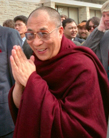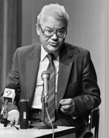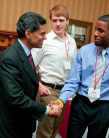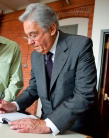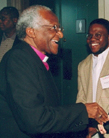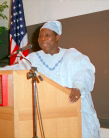GLOBAL
Charting the future: After a half century, the Einaudi Center looks ahead
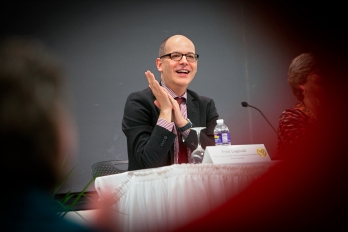
Einaudi Center Director Fredrik Logevall at the Einaudi Center's 50th anniversary symposium Nov. 14. See larger image
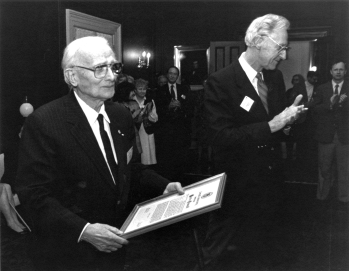
Mario Einaudi and Cornell President Frank H.T. Rhodes at the center's renaming ceremony in 1991. See larger image
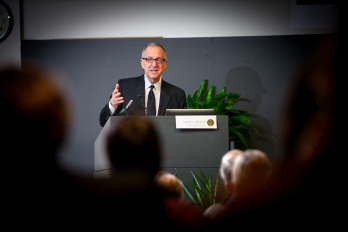
Cornell President David Skorton addresses the Einaudi Center's 50th anniversary symposium Nov. 14. See larger image
From Cornell's earliest days, the university has looked outward. The first entering class of 407 students boasted five international students. For more than a century, Cornell has educated Chinese students and participated in large-scale research and scholarly exchange with China. When the Qatar campus of the medical college opened in 2001, Cornell became the first American university to offer its M.D. degree overseas.
This year the Mario Einaudi Center for International Studies, a key hub of international activity at Cornell, celebrates its 50th anniversary. "The university needs a robust, vibrant center for international studies," says Einaudi Center Director Fredrik Logevall, the John S. Knight Professor of International Studies. "We harness, direct, organize and support much of the international programming at the university."
At the center's 50th anniversary symposium in November, Cornell President David Skorton outlined his vision for international studies and international engagement at Cornell. Because the world's chief problems transcend national boundaries, he emphasized it is necessary to replenish faculty ranks with scholars who bring an international dimension to teaching and research. He also called for increasing the number of undergraduate students who engage in international experiences to 50 percent and expanding efforts to fund-raise for international studies.
Chris Barrett, the Stephen B. and Janice G. Ashley Professor of Applied Economics and Management and a symposium panelist, said, "Most of the world's biggest problems will take place in areas of the world where Cornell is comparatively advantaged to make a difference."
In addition to faculty's impact through international engagement, he said, Cornell's impact can be multiplied many times through its students. "We can have a bigger footprint in the world if more of our students have international experiences," he said.
The Einaudi Center provides a home to seven core programs and supports 11 thematic international programs, and, through the 800 Cornell faculty members associated with its programs, makes an impact on virtually the entire student body. In addition to serving as an umbrella organization, it has its own programming and offers grants to graduate students and faculty.
"Cornell was a pioneer in the emphasis on regional expertise in many disciplines," Logevall said. "This was an interdisciplinary enterprise from the outset, bringing people together to educate Cornell students about the world, and in many cases making a contribution to solving problems. It's a very rich history. Today, we're reinventing ourselves to make our best contribution to the university's vision."
The center has hosted foreign policy luminaries and former presidents as Bartels World Affairs lecturers and as participants in the center's Foreign Policy Distinguished Speakers Series. It also conducts K-12 outreach, sponsoring college students to share their expertise about nearly every continent.
Launched in 1961 as a focal point for international studies and activities, the Center for International Studies expanded its operations in the '70s and '80s to include international development and organize the international undergraduate experience. In 1991, the center was renamed in honor of its founder, Mario Einaudi, the Goldwin Smith Professor of Government.
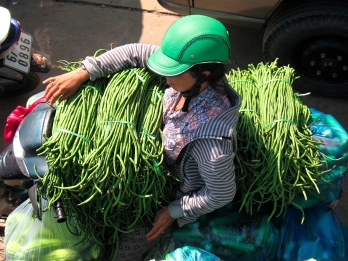
"Veggie-mobile," a photo taken in Vietnam's An Giang province by Edmund Joo Vin Oh. For years, the Einaudi Center has held a photo contest that features Cornell graduate students' images from abroad. See larger image
Upcoming plans for the Einaudi Center include bolstering the popular international relations minor and further developing the Foreign Policy Initiative by establishing a practitioner-in-residence program and by taking the center's popular faculty-alumni roundtable discussion of contemporary issues on the road, first to Washington, D.C., and eventually to other cities.
At the symposium, Logevall also announced that the Einaudi Center has just received the go-ahead to offer a postdoctoral fellowship program in global affairs with a likely emphasis on security studies, broadly conceived. "Thanks to the tremendous generosity of the Bartels family, we're now in a position to make this happen," he said.
The program is expected to launch in fall 2013 with two fellows, each of whom will teach an undergraduate class.
Many peer universities, Logevall noted, have devoted major resources to international studies and global engagement. "Over the past few decades, Cornell has not made that same investment," he said. "We're paying a price for that. … It is by no means too late, but we have work to do."
"In this regard, it is good news," he said, "that international studies is a priority in the 'Cornell Now' campaign."
Alice Pell, Cornell's vice provost for international relations, said Cornell is poised to accelerate its activities and seeks to infuse an international dimension into all aspects of learning, research and engagement. "We are in a place where new ideas and approaches are possible. We have an opportunity for change," she said.
